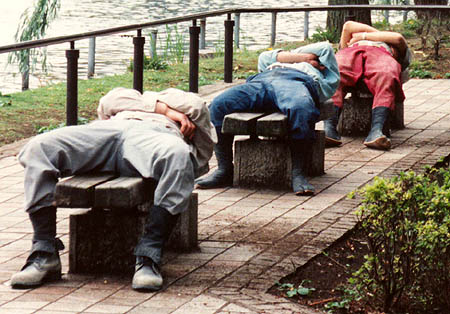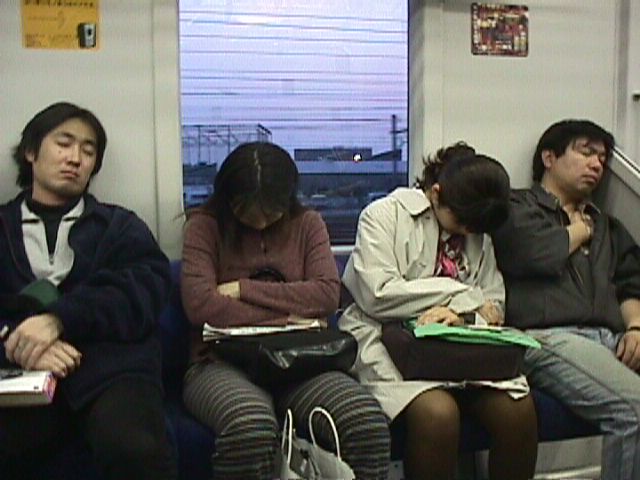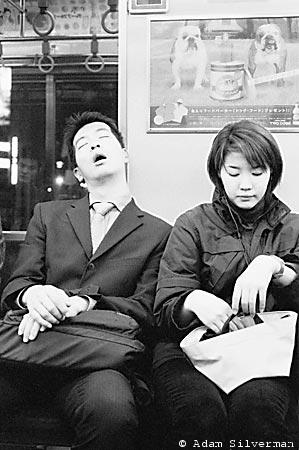
'Nap salons' are popping up all over Japan:
For high school students everywhere, the classroom desk is often a place to catch a few winks of sleep. But instead of receiving a scolding, dozing teenagers at Meizen high school are more likely these days to find their teachers dimming the lights, putting on classical music and joining their students for a power nap.
In a nation known for its tireless diligence, the students have joined a repose revolution that has investment bankers and bureaucrats sharing lunchtime with the sandman. Meizen High, in this progressive southern metropolitan area of 5 million, last year became the first school in the nation to promote mental alertness by officially encouraging all students to take 15-minute naps in their classrooms after lunch. Several schools have followed suit, and others have said they might adopt the practice.
After-lunch naps have long been stigmatized as a sign of laziness in a society that experts call among the most sleep-deprived on earth. But, suddenly, they have become the latest rage, part of a mental alertness craze sweeping a nation known for its fondness for such fads.Inventions From the Old Days: "Slave-driving Japanese bosses have now introduced the 'Nap Man' to the work place. No matter if you spend 5 hours commuting each day, if you dare to nod off at work, 'Nap Man' gives you a friendly 1 volt *ZZZTTTTT!* to urge you back to work. The traditional 'three strikes' rule, of course, applies to frequent noxious nappers. Don't ask what voltage THAT is!"
A flurry of scientific studies, books and high-profile news reports are heralding mini-siestas as an integral part of new daily regimens for enhancing mental agility.
Particularly popular in these regimens are activities such as coloring books that challenge adults to stay inside the lines of a Van Gogh painting and video games that are said to test intelligence with rapid-fire questions.
Nap salons
But the rise of the mini-siesta is perhaps the most noticeable evidence of the Japanese interest in gaining a mental edge. In the past two years, nap salons, as they're known, have popped up in Japan's major cities. One such salon in central Tokyo, Napia, boasts some 1,500 members. Fatigued office workers can take a brief lunchtime nap on a daybed there for the equivalent of about $4.50.
The Japanese have gotten the nap down to a science. Sleep studies by researchers in Japan and abroad have suggested that nappers not let their afternoon slumber last more than 30 minutes, lest they fall into a deeper sleep and awake feeling more groggy than refreshed. To that end, Napia offers its customers a cup of coffee before nap time. Caffeine takes about 20 minutes to kick in, so the java kick acts as a natural wake-up call.
"My nap is such an important part of my day," said Kunikazu Tabata, a 39-year-old asset manager who began napping regularly a year ago. Straightening his tie and rearranging his hair in the Napia lobby after a 25-minute power nap, he continued: "With the economy getting better, I've got more and more work and am only getting about five hours of sleep at night. Without this nap, I'd be tired all the time."
Department stores and catalogues now sell "desk pillows." Some Japanese companies have successfully pressed to have nap salon fees covered by health insurance providers, while others are endorsing something long unthinkable here -- in-office napping. On a recent day at Japan's Environmental Ministry, several young workers in the final stretch of their lunch breaks could be seen unabashedly dozing, their cheeks resting on plush towels spread out over their arms. Inside the Tokyo offices of Toyota Motor Corp., afternoon power naps have become commonplace -- particularly because the company switches off the office lights during lunchtime to save energy.
"When we see people napping during lunchtime, we think, 'They are getting ready to put 100 percent in during the afternoon,' " said Paul Nolasco, a Toyota spokesman in Tokyo. "Nobody frowns upon it. And no one hesitates to take one during lunchtime either."National debate
Images of exhausted executives conked out inside coffeehouses or on buses or subways during long commutes home have long been a fixture of Japan's urban landscape.
But the office power nap was anathema to Japan, even as the concept became popular in the United States and Europe. Naohisa Uchimura, a sleep specialist at Kurume University in southern Japan, said that began to change in 2003 after a bullet-train conductor made headlines by nodding off at the controls.
Though automatic train mechanisms prevented an accident, the driver's inability to get enough sleep at night started a heated national debate.
"People are realizing that our lack of sleep is actually slowing us down," Uchimura said, adding that Japanese workers get an average of between five and six hours of sleep a night. "To be in top shape well into the evening hours at the office, you need to take a nap."
Japan is actually re-catching nap fever, said Tadao Hori, a sleep researcher at Hiroshima University. Afternoon napping -- particularly among farmers who toiled in the early morning -- was a common practice in ancient Japan, he said. The custom expanded during the 17th century after missionaries from the Iberian Peninsula brought the concept of siestas to Japanese shores.
"I don't know if all the samurais were taking siestas, but I can say that after Japan was exposed to the 'non-siesta' countries in Europe -- England, Germany, France -- the idea of napping gradually became taboo in Japan," Hori said. "Thankfully, that is now changing."
'Changed my life'
It has been to the benefit of the 991 students at Meizen high school, where summer break does not begin until July and where surveys showed most students slept only five to six hours a night. Since the napping program was introduced in June 2005, test scores have markedly increased and reports of students drifting off during class have sharply declined, said the principal, Shinei Otaka.
"You can't compare the lifestyles of these kids to kids back in the States," said Melissa Fabrose, the English teacher at Meizen who is on an exchange program this year from her San Francisco high school. "Most of these kids are waking up around 5:30 or 6 a.m., and lots of them are commuting on public transport. Some of them are traveling more than two hours each way and then spend lots of time studying. They don't have a lot of time to sleep."
Though the afternoon naps at Meizen are optional, they are strongly encouraged. Most students have eagerly seized the opportunity. Masaki Chiba, a 15-year-old freshman who dreams of being an astronomer, said he selected Meizen from eight possible high schools in his district because of the napping program.
"There was a time when I wasn't able to nap because of my commitments with the astronomy club, and I felt like I'd lost my concentration," he said. "It's changed my life."
Japan is a nation that is seriously out of balance. They’re moving in the wrong direction - the multinational corporate model, American-style. Previously in Japan, people were falling asleep on the job and in class, and were chastised for it:
 "Slave-driving Japanese bosses have now introduced the 'Nap Man' to the work place. No matter if you spend 5 hours commuting each day, if you dare to nod off at work, 'Nap Man' gives you a friendly 1 volt *ZZZTTTTT!* to urge you back to work. The traditional 'three strikes' rule, of course, applies to frequent noxious nappers. Don't ask what voltage THAT is!"
"Slave-driving Japanese bosses have now introduced the 'Nap Man' to the work place. No matter if you spend 5 hours commuting each day, if you dare to nod off at work, 'Nap Man' gives you a friendly 1 volt *ZZZTTTTT!* to urge you back to work. The traditional 'three strikes' rule, of course, applies to frequent noxious nappers. Don't ask what voltage THAT is!"Then, Corporate media mocked it and legitimized sadistic cruelty:
In addition to sleep deprivation, these people now have PTSD.
The true motivation behind the mocking – Japanese business was losing $30 billion annually to sleep deprivation.
This current campaign to de-stigmatize napping avoids a discussion that needs to take place in Japan (and all democratic nations worldwide): Would you rather sleep or earn $30 billion for upper management, CEOs, Boards of Directors and shareholders to enjoy?
If there is so much work to do that workers aren't getting necessary sleep, much less off-work hours to support balanced lives with families, friends and other interests, businesses need to hire more people to do the work. If workers spend hours traveling to work and back home daily, if students are not sleeping enough, if they must travel more than two hours to reach school each day and then travel more than two hours to get home again that same day, the entire society is out of kilter.
People all over the world are looking to have more leisure time, not more time working. The Japanese are no different. They are losing sleep not because they want to walk around in a continual fog, not because they love their work, or love to study, but because to get their jobs and to keep their jobs, they must sustain nearly impossible work loads that leave them chronically sleep-deprived.
Instead of Corporations and the government leaders beholding to them creating cities that would support balanced democratic culture, they respond: “If you must sleep, do it on your own time…while you eat or shower.”
Corporations aren’t offering to share the wealth derived from improved productivity. Workers worldwide are told that they must continually improve work productivity and expect little, if any, added compensation for their efforts. In many corners of the world, the satisfaction of having a job should be compensation enough.
Corporate heads stress that the continually increasing, high productivity quotas for employees are necessary for the Corporation’s health and to remain competitive in a global marketplace. Toward that end, Corporations think nothing of wringing the last drop out of the work force. It’s a trend in industrialized nations everywhere: A complete dedication and commitment of the worker’s life to the corporation. But it’s not a two-way street.
'The New World Order' and the backwards motion of the human condition
The term (“the new world order”) was used in a speech given in 1990 by then President George H.W. Bush. It was never defined or explained, yet it became the basis for which Conservatives raced to accomplish their wildest dreams: A tax-free Xanadu, with unrestricted growth, no social or moral responsibility, with runaway profits for a very few so that they may escape behind gated communities the hell they've wrought on the world.
It had to done quickly, before anyone could think and realize where it would lead. By fanning anxiety, whipping up an apocalyptic sense that “we’re all on our own" and it’s “every man for himself.” It has proven a convenient distraction as Republicans raid the U.S. Treasury, raid pension funds, destroy unions, social security and Medicare, government agencies, assistance programs and the expectations of citizens (rescue operations after civil emergencies). It is exactly the wrong model for a world that is growing smaller by the second.
Are Long Working Hours, Poor Working Conditions, Long Worker Commutes Necessary to Businesses' Survival?
Of course not, and they're only possible with UNREGULATED capitalism, and its lopsided compensation structure: Benefits and bonuses for upper level management, annual multi-million dollar profit-sharing bonuses and platinum parachutes for CEOs. The workers actually toiling and creating the product can expect health benefits' cuts, pension takeaways, longer working hours for less compensation all under a constant threat of losing jobs to overseas workers willing and able to work in a country where the cost of living is a fraction of that in the U.S. If those workers actually receive any compensation at all.
It is impressive how trusting and cooperative workers are when it comes to helping Corporations resist regulation, even if it means their own inhumane treatment (and the inhumane treatment of others half a world away. That only works for so long. As the world grows smaller and the internet brings everyone everywhere nearer to one another, there are growing numbers of informed and pissed off people waking up to the inequities in their lives caused by a world run by Conservatives.
It is eminently possible for employee- and environment-friendly businesses to compete and prosper. Regulated versus unregulated capitalism, "making a living" as opposed to "making a killing." It can be done, and it will be done. It will just take a little longer.
Filed under: Japan, nap salon











No comments:
Post a Comment